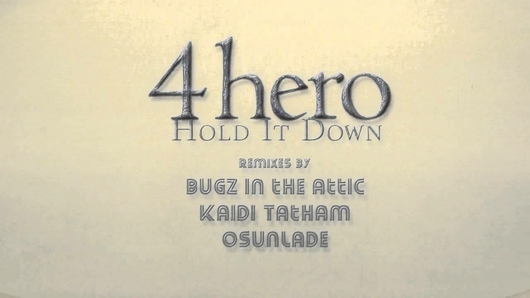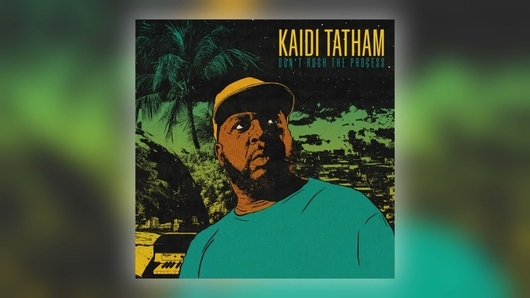
Kaidi Tatham: trust the process
With a discography that spans jazz, broken beat, hip-hop and soul, Kaidi Tatham's influence on UK music is untold, but often under-appreciated. With his new album, 'Don't Rush The Process', he’s stepping into the spotlight like never before. Sam Walton speaks to him about escaping pigeonholes, learning by ear, and looking for the ‘ouch’ moment in music
On a Saturday lunchtime somewhere in Belfast, Kaidi Tatham — DJ, producer, multi-instrumentalist and one-time member of influential production crew Bugz In The Attic — is gesticulating excitedly in front of his webcam, trying to explain what currently drives his music. “Sometimes you come up with a passage in a song where everything locks in, and there’s a moment,” he explains, his right hand giving the Italian chef’s kiss gesture. “And you just want to rewind and play that moment again for people so that they can say, ‘Yes, Kaidi, you’re pretty good’.”
He sits back and chuckles to himself in a warm, satisfied reverie. “Thing is, I’ve always been humble,” he continues, “Like, I feel really weird and shy about playing my music when I’m out DJing. But in the last couple of years I’ve been thinking to myself, ‘you know Kaidi, you are pretty good at what you do’, and that’s because I’ve put a lot of years into this now. I’ve worked hard for 25-odd years to get here, and it’s one of the best places I’ve been in for a very long time.”
It’s nothing new for a musician to exude confidence in an interview. But where many versions of that confidence can appear brash or grating, Tatham’s is three-dimensional and rather heart-warming, because it feels well earned — a product of hard work over hype. Despite being one of the early noughties architects of broken beat, a genre whose tentacles have wrapped themselves around so much of dance music in the subsequent years, and his name featuring in the credits of over 800 records in the past quarter-century, Tatham has made it to 48 flying largely under the radar, without so much as a Wikipedia page to call his own.
Accordingly, on this warm July Saturday, his gently greying beard and embrace of comfy middle-aged domesticity give his enthusiasm for all music, not just his own, a winning authenticity. He wears a faded Fresh Prince T-shirt and starts our conversation by telling me about the trials and rewards of bringing up his seven-and eight-year-old kids, and then, as he rattles through his latest projects and fills me in on how he got here, a story emerges not just about Tatham’s music and taste, but about the quest for contentment and healthy self-reflection. It adds up to a manual for how to make those special musical moments happen as often as possible.
Tatham moved to Belfast 14 years ago, but grew up in Redditch, 10 miles south of Birmingham, in a household that loved music but didn’t perform it. His dad’s record collection, however, full of soul, disco and funk, was always scattered around the house, and it was his Auntie Pam who took it upon herself to educate young Kaidi with it.
“She was such a big influence,” remembers Tatham. “She was into Earth, Wind And Fire, Michael Jackson, rare groove, all the two-step.” He pauses and smiles. “I can remember her playing me Parliament, and Pleasure. Now, if people don’t know about Pleasure, this one here...” Tatham spins around and pulls Pleasure’s 1977 album ‘Joyous’ from a rack of LPs beside him and waves it at the camera, revelling in the tangent — “is a serious, serious album. They’re a very funky outfit, Pleasure, and they can play.” Then he checks himself for a moment: “But they’re no Earth, Wind And Fire!”
Indeed, Maurice White’s genre-spanning outfit is Tatham’s musical cornerstone, despite their occasional reputation for wedding disco cheesiness. “I always get teased about it — ‘oh, you and your Earth, Wind And Fire’,” he admits, “but they’re what really got me into music. I love that keys–flugelhorn–sax combo. It’s all about the combos!”
At school, Tatham took flute lessons, and despite being picked on for it, he was good enough to first get into the National Children's Wind Orchestra, and then, aged 18, get onto a BTEC National programme in Performing Arts in London, where the presence of grand pianos “literally everywhere” and sympathetic tutors converted him into a keys player, learning by ear, listening and responding. “I didn’t know anything about key signatures, but I had a good ear, so I could hear things and just work them out,” he remembers of his training. “The more I listened to music, the more my ear kind of developed.”

"I really want to make people dance with this one, and that’s all it is. It’s about funk and soul, and just good, uplifting music, because we’ve had two years of this pandemic and a lot of people just want to go out and have a dance now.”
When a course-mate then introduced him to The Herbaliser, who at the time were just recruiting a rhythm section, Tatham leapt at the chance, and in doing so gained entry to the close-knit scene of west London DJs and producers who would coalesce into Bugz In The Attic. Jaded by the poppier direction that UK garage was taking at the tail end of the ’90s, the collective were among a handful of new producers instrumental in shaking up that sound. Sprinkling the original breaks with jazz changes and soul inflections, they invented a new genre, “broken beat”.
Bugz became synonymous with broken beat, and Tatham’s virtuosic Rhodes cluster chords and intricate drum programming were its trademarks. Tatham released the ‘Feed The Cat’ album as Agent K in 2002, a retro-futurist slab of broken beat-indebted boogie laced with Brazilian rhythms and burbling electronics, but otherwise confined his genre contributions to other producers’ tracks which, thanks to then-new file-sharing tech, spread like wildfire online without bothering the charts or mainstream radio.
Broken beat never crossed over or had a definitive single — the nearest it got was Bugz’ astonishing remix of 4hero’s ‘Hold It Down’, with its audacious hard stop siren midway that can still slay a dancefloor 20 years on. Despite its unassuming history, though, it’s impossible to listen to much of today’s dance music, from UK funky and wonky to the [landmark Brownswood Recordings compilation] ‘We Out Here’ generation of new UK jazz, and even dubstep and grime, without observing the fingerprints of broken beat and, consequently, of Kaidi Tatham.
Plenty of producers would trade on such cult ubiquity, churning out copycat productions once they’d hooked onto a formula. However, it’s a tribute to Tatham that within a couple of years of being at the vanguard of a new genre, he’d already started moving away from it, and today has left it behind so much that he slightly bristles at the association.
“To be honest, it kind of annoys me,” he winces, when I bring up broken beat and look for any fond reminiscence. “Like, any piece of music that I put out now, it’s like, ‘Kaidi, he’s the broken beat king, yeah he’s the Herbie Hancock of whatever’, and I’m like, ‘I’m not, man!’ You know, I love Herbie Hancock, but there’s a lot of better players than me, and it’s a lot of pressure on me. Listen, they’re flattering words, and that’s very nice, but I’m just Kaidi Tatham and I’m doing my thing.”
And fair enough, really. After all, Tatham’s new album, ‘Don’t Rush The Process’, is exactly the sound of Tatham just doing his thing, seemingly untethered to a particular movement and, crucially, containing only flecks of broken beat. Instead, his fourth solo record (fifth if you include ‘Feed The Cat’) is a mix of piano-driven summertime boogie, boom-bap instrumental hip-hop, jazzy soul-funk and lushly cinematic interludes, with the only through-line being Tatham’s desire to get you moving. “I really want to make people dance with this one, and that’s all it is,” he declares of his motivations this time round. “It’s about funk and soul, and just good, uplifting music, because we’ve had two years of this pandemic and a lot of people just want to go out and have a dance now.”

“I’ve got plugins that sound so live, I’ve had people asking me who’s playing, but the method I have is just to play it all in like a real player — so it’s all about timing.”
Perhaps just as interesting as ‘Don’t Rush The Process’s stated intention, though, is how its construction contributes to those aims. Although something this carefree and funky gives every impression of a bunch of musicians hanging out in a studio bouncing lead lines and rhythms off each other to create effortless-sounding grooves, the bulk of Tatham’s album is, surprisingly, played on a computer. “Everything is just on a computer, keyboard, microphone,” he laughs, when I enquire about his “band”. “Some stuff is live — there are a couple of tunes with my boys, the horn players from the Herbaliser — but most things are programmed on a computer.”
It quickly transpires, though, that Tatham is no conventional dance music programmer, where the DAW is so often used as a labour-saving device. Indeed, Tatham’s process sounds laboriously human. “I've got plugins that sound so live, I’ve had people asking me who’s playing, but the method I have is just to play it all in like a real player — so it’s all about timing,” he explains.
There follows a loveable digression about playing the shaker properly, but he concludes, “If you see a band and they’ve got the timing properly, oh my you’re happy. Someone’s got that pulse on you, and it makes you bounce even more. So I’ve got all the instruments right here, and now I just have to make them hurt me. I have to have that ‘ouch’ moment when I’m doing rhythm stuff.” He purses his lips and furrows his brow, as if in both exquisite pleasure and pain. “I’ve got to hurt myself. If I don’t hurt myself, it’s not good.”
Clocking in at a shade under 35 minutes, another distinguishing feature of ‘Don’t Rush The Process’ is its conciseness. That no-fat feel lends the album a pleasing sense of purpose, I suggest to Tatham, but he has other reasons for brevity. “I know a lot of people are going to be like, ‘where’s the rest of it?’” he chuckles again, “but that’s because another album will be coming soon, and after that I’m going to do a vocal album, and then a Brazilian album — I’ve got one on the go, and it’s dangerous!”
That’s a lot of music sat in the vaults, DJ Mag suggests. Why is he putting out ‘Don’t Rush The Process’ first in the run? “Oh, it’s a pure taster,” he replies, flashing the knowing smile of a man carrying a handful of aces. “Literally, pure taster,” he continues, “because I’ve got some disgusting stuff coming!”
We mention his recent collab single with Jazzy Jeff and Japanese singer/actor Gen Hoshino, a breezy slab of city pop retooled with chart-R&B leanings that’s on the one hand unlike anything he’s done before, but also smuggles in a couple of tell-tale Tatham rhythmic kinks and chewing-gum basslines. “Oh yeah,” he remembers, “I’ve got two or three records with Jazzy Jeff just waiting for you, too. Thing is, I’m writing every day, and I just want to let people know this, because they think, ‘oh Kaidi, he’s the broken beat guy’, and I just don’t want to be that.”
He may be about to have that wish granted: between ‘Don’t Rush The Process’ (and all that might follow), and his calmly charismatic self-possession, seemingly borne of hard work both at the computer and away from it, Tatham’s beats appear to have finally broken free.


